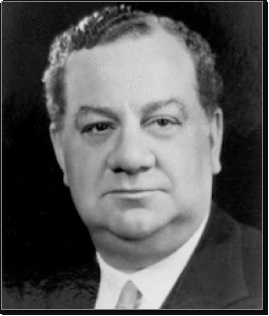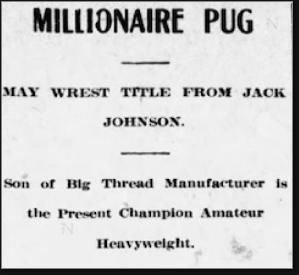
Sport: Boxing
Born: July 31, 1888
Died: November 22, 1943
Town: Monmouth Beach, New Jersey
e boy who went by Warren was the third of four sons born to Adelaide and William Barbour. William’s family owned a linen manufacturer with factories and distribution on both sides of the Atlantic. Thousands of Irish immigrants found work in their Paterson mills. William contracted tuberculosis as a teenager and, by the time he enrolled at Princeton, he was still sickly and overweight. The Barbours pulled him out of school and hired Jack Cooper to be his personal trainer.
Cooper’s recuperation plan was built around intense exercise, including boxing. Warren dropped 30 pounds and proved so proficient in the ring that he began competing in—and winning—amateur bouts. He sparred with professionals in crowded, sweaty New York City gyms and went from an object of curiosity to a legitimate contender.
Warren stood 6’1” and weighed 200 pounds at this point and was a quick and clever fighter. In 1910, he out-pointed New England champion Joseph Burke on his home turf in Boston to claim the U.S. amateur Heavyweight title. The post-fight headlines read “Millionaire Is World’s Champion Amateur Boxer.” In 1911, Warren took the Canadian title, as well.

Warren’s victories caught the attention of President Theodore Roosevelt and former champion Gentleman Jim Corbett. They urged him to turn professional and challenge reigning champion Jack Johnson. Warren’s father was all for it, but his mother forbade him to box professionally and that was that. Warren maintained his boxing connections and served as timekeeper at the 1919 Jack Dempsey–Jess Willard title bout in Toledo.
Warren took over the running of the family business following his father’s death in 1917. He got into politics a few years later and, in 1930, was chosen by New Jersey Governor Morgan Larson to fill the US Senate seat of Dwight Morrow, who passed away in October. Warren, a Republican, was re-elected in 1932 despite an overwhelming Democratic victory in the national elections. During his time in the Senate, he championed the opening of Sandy Hook for public recreation and wrote a bill that would have opened America’s doors to victims of the Holocaust. He died in 1943 before he could push the bill through.